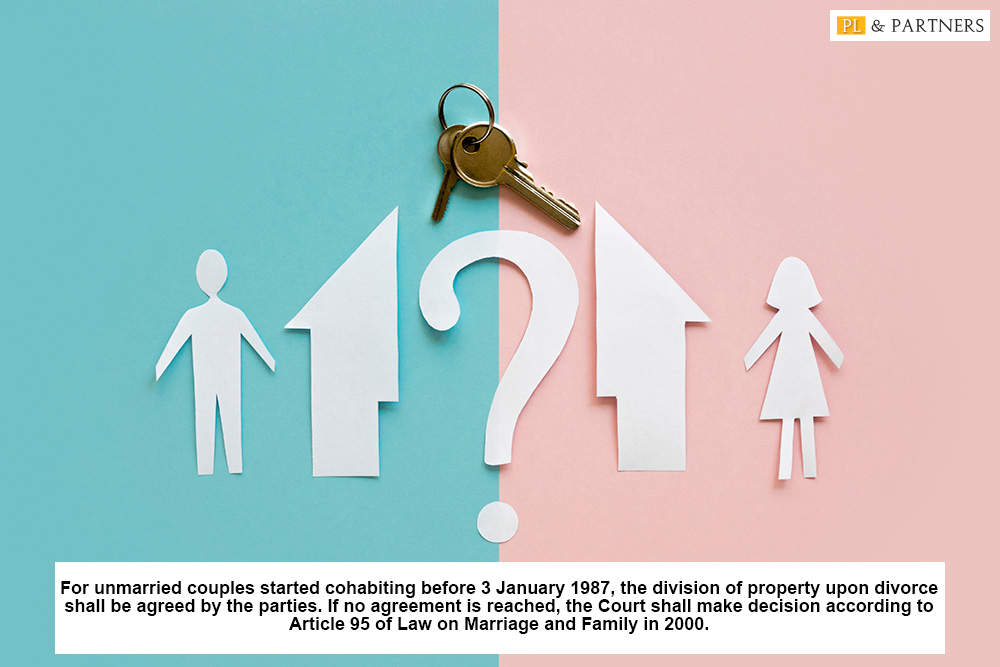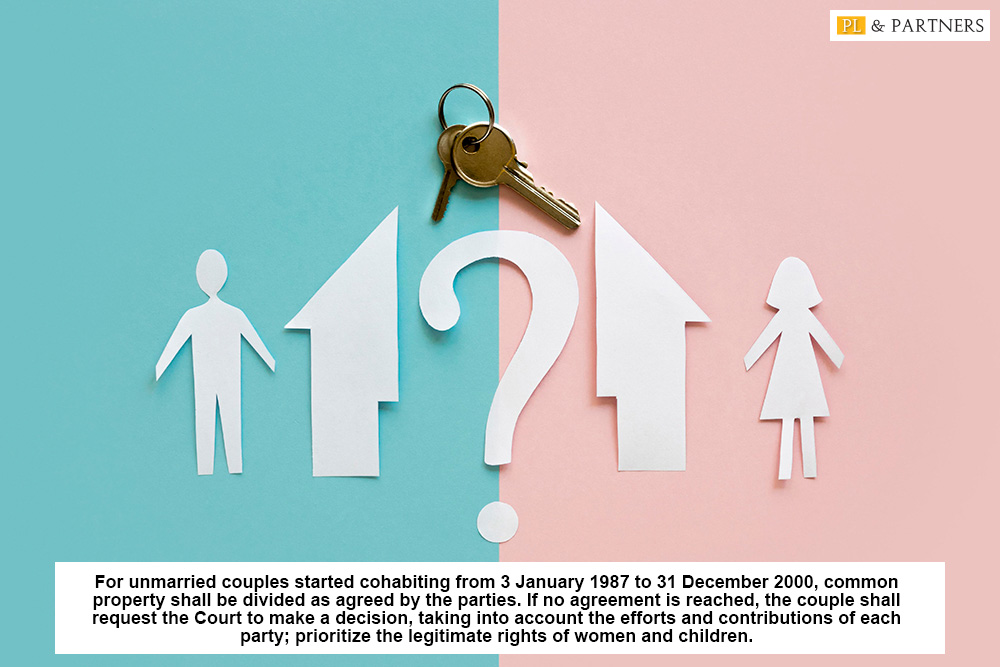Currently, cohabitation of opposite-sex couples has become more and more common. During cohabitation, the couple may have their common property without express agreements and documents. As a result, it is difficult to divide those properties. So how to divide the common property of unmarried couples to ensure the interests of both in accordance with the law?
According to applicable regulations, the division of common property of unmarried couples shall be divided into three cases as follows:
Nội dung bài viết
Toggle1. DIVISION OF COMMON PROPERTY IN CASE OF COHABITATION STARTING BEFORE 3 JANUARY 1987.
Pursuant to Article 44.2 of Decree No.123/2015/ND-CP, in case unmarried couples started cohabiting before 3 January 1987, the marriage is still recognized. Vietnamese laws accept this common-law marriage only if both parties are unmarried or have married but divorced. The marriage period, in this case, commences from the time they started cohabiting.
At that time, the division of property upon divorce is specified in Clause 3.a of Resolution 35/2000/QH10, and Section 1 of Joint Circular 01/2001/TTLT-TANDTC-VKSNDTC-BTP. Accordingly, the division will be settled according to the principle of division of common property after divorce of the Law on Marriage and Family 2000. In this case, the division shall be agreed upon by the parties. If no agreement is reached, the couple shall request the Court to divide their common property.
Thus, the division of property will first be agreed upon by the husband and the wife. If no agreement can be reached, the Court will make a decision pursuant to Article 95 of the Law on Marriage and Family 2000.

2. DIVISION OF COMMON PROPERTY IN CASE OF COHABITATION COMMENCING FROM 3 JANUARY 1987 TO 31 DECEMBER 2000.
This case is guided by Clause 3.a of Resolution No. 35/2000/QH10 and Section 2 of Joint Circular 01/2001/TTLT-TANDTC-VKSNDTC-BTP.
Accordingly, opposite-sex couples cohabitating from 3 January 1987 to 31 December 2000 and meeting all the conditions for marriage as prescribed by law, are obliged to register their marriage within 2 years, until 1 January 2003.
Within this time limit, if they do not register their marriage, they will not be recognized as husband and wife, and if there is a request for divorce, the Court shall apply the regulations on divorce in Article 95 of the Law on Marriage and Family 2000. The division of common property shall be agreed upon by the parties. If no agreement is reached, the couple shall request the Court to divide the property.
From 1 January 2003 onwards, if they do not register their marriage, the law will not recognize them as husband and wife. If they have a request for division of common property upon divorce, the Court shall apply Article 17.3 of the Law on Marriage and Family 2000 to annul the illegal marriage. Accordingly, the common property is divided according to the agreement of the parties; if no agreement can be reached, they shall request the Court to make a decision, taking into account the efforts and contributions of each party; prioritize the legitimate rights of women and children.

3. DIVISION OF COMMON PROPERTY IN CASE OF COHABITATION FROM 1 JANUARY 2001 ONWARDS.
Pursuant to Clause 3.c of Resolution No. 35/2000/QH10 dated 9 June 2000, the relation of opposite-sex couples cohabiting from 1 January 2001 onwards will not be recognized as a marriage by the law. Therefore, they don’t have the rights and obligations of husband and wife.
Section 3 of the Joint Circular No. 01/2001/TTLT-TANDTC-VKSNDTC-BTP stipulates the division of common property in this case. Accordingly, the division of common property without marriage registration will be resolved according to the agreement between the parties. In the event that an agreement cannot be reached, the division shall be in accordance with the applicable Law on Marriage and Family of each period and other relevant law such as the regulation on joint ownership under the Civil Code.
In addition, it should be noted that the division of common property of cohabitation couples must ensure the legitimate rights and interests of the woman and their common children.
The above are cases of division of common property when the couple didn’t get married.

If you would like to subscribe to our services or have any inquiries about our services, please don’t hesitate to contact us at:
PL AND PARTNERS LAW FIRM
Headquarters: 46th Floor, Bitexco Financial Tower, No. 2 Hai Trieu, Ben Nghe Ward, District 1, Ho Chi Minh City, Vietnam
Office: Lot 1.16 Viva Riverside, 1472 Vo Van Kiet, Ward 3, District 6, HCMC
Hotline: 093.1111.060
Email: info@pl-partners.vn
Facebook: www.facebook.com/PLLaw
Website: www.PL-PARTNERS.vn – www.HOIDAPLUAT.net – www.THUTUCPHAPLY.org
We are always ready to assist you.







